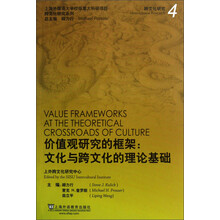Acknowledgements
Series Preface
Foreword
Preface to the Two Values Volumes
Part One
第一部分
Reviewing History"The Beginnings of
Comparative Cultural Values Studies
历史背景:跨文化价值观比较研究的起源
Chapter 1 Values Studies:The Origins and Development of Core
CrossCultural Comparisons
Chapter 2 The Empirical Foundations of Current Values Research
Chapter 3 Values,Valences,Actions,Justice,and Emotions: The Flinders Program of Research on Values Forty Years On Norman TFeather
Chapter 4 Value Frameworks across Oaltures:Hofstede’S,Ingelhart’S, and Schwartz’S Approaches
Part Two
第二部分
Bui lding Frameworks:The State of the Art on Empi rical Values Research
构建框架:价值观定量研究的技巧及现状
Chapter 5 Dimensionalizing Cultures:The Hofstede Model in Context
Chapter 6 Expanding Hofstede’S Model with New Dimensions from the World Values Survey and National Statistics
Chapter 7 Measuring National Cultures:Forty Years On Peter BSmith
Chapter 8 Basic Human Values:Their Content and Structure across Cultures
Chapter 9 Robustness and Fruitfulness of a Theory of Universals in Individual Values(The PVQ)
Chapter 10 Mapping and Interpreting Cultural Differences around
the World
Part Three
第三部分
Integrating Comparisons:Moving Ahead with Values Research
综合比较:价值观研究的继续发展
Chapter 11 Universal Human Rights as Universal Values:A Historical Perspective
Chapter 12 Beyond Value Differences in Intercultural Research:
State—ofthe—Art Research on Attributional Differences and Their Implications for Cross—Cultural Interactions
Chapter 13 The Cultural Fit of Global Values Surveys in East Asia:The Urgency to Include East AsianOrigin Concepts
Chapter 14 Going Beyond Chinese Values:An Insider’S Retrospections
Chapter 15 What Does It Mean to Be“Chinese”?Studying Values
as Perceived by Chinese Immigrants to the United States and by Their Children Todd LSandel, Anna WongLowe,and Wen—YuChao中大德,黄颂安,赵文煜
Chapter 16 Revisiting Trompenaars and HampdenTurner: Drawing the Lines of Intercultural Communication in a China—European Joint Venture
About the Authors
About the Series

 缺书网
缺书网 扫码进群
扫码进群
 缺书网
缺书网 扫码进群
扫码进群